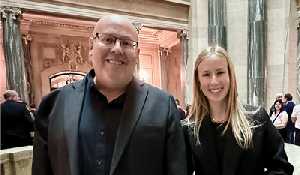It’s a new one alright—everything is new
July 24, 2017, 11:55 am

British pop superstar Ed Sheeran made his cameo on Game of Thrones the other night and his four word speaking part hit an odd and ironic note.
The more you think about it, it was an interesting social commentary.
Sitting around a campfire and singing a lilting Medieval song with a group of soldiers, Sheeran’s character is discovered by Arya Stark, who has just finished dispensing some well-deserved revenge against the people who killed her family.
Arya observes “that’s a pretty song—I’ve never heard it before.”
Ed Sheeran deadpans “it’s a new one.”
The creator of the Game of Thrones fantasy series, George R. R. Martin, says that it is set in Medieval times, which is surely supported by the sword play, wardrobe, armour and squalor.
But some historians argue that its social constructs, politics and cultural themes place Game of Thrones some years later than the Middle Ages.
In any event, the idea that a song is “a new one” is today’s sly wink back at 1,000 years of history. Newness or novelty is a hallmark of modern culture, not the Medievalists.
From our technology at work and home to new clothing fashions several times a year, to a culture that constantly reinvents its newness—even to entirely brand-new designs of smart phones, golf clubs and cars every season—modern consumer culture is defined by “new.”
So much of innovation is driven by the stunning pace of change and big data. Today’s technology will be improved next year.
But it is also fostered by consumer expectations and demand—the status quo will not do three years in a row.
Even in the music world that Ed Sheeran dominates, thousands of aspiring artists frantically hope their “new one” might make it to the pop charts (most won’t).
The platinum selling Sheeran did not release one new song earlier this year but two new songs on the same day—both are now mega hits.
New is not necessarily new. For millennia novelty and innovation were the principles that challenged and expanded what societies knew within their limited existing culture of knowledge.
And years ago we knew far less in a world that was smaller and more insular. Information took longer to travel.
Arguably, in the Middle Ages where people—illiterate and relying on oral history—spent their entire short lifetimes within the reach of a few miles, there was great room for the introduction of new things.
But on the contrary; generations passed with nothing new or innovative ever being introduced.
Today, even the expression from years ago “new and improved” seems trite. Are there any consumer products not continually being improved or at least repackaged or rebranded?
Modern consumer culture and the focus on newness have grown at warp speed since the evolution of the modern middle class after World War II.
But even just two generations ago, “new” was not always presumed. Not everyone was assured new stuff for birthdays or Christmas gifts, nor were shoes or back to school clothes always necessarily new.
Today we bask in the new. Our culture is so often defined by “it’s the new one.”
What this should do is challenge each of us to search and find authentic experiences—not necessarily because they are new—but because they endure and enrich our lives.




































